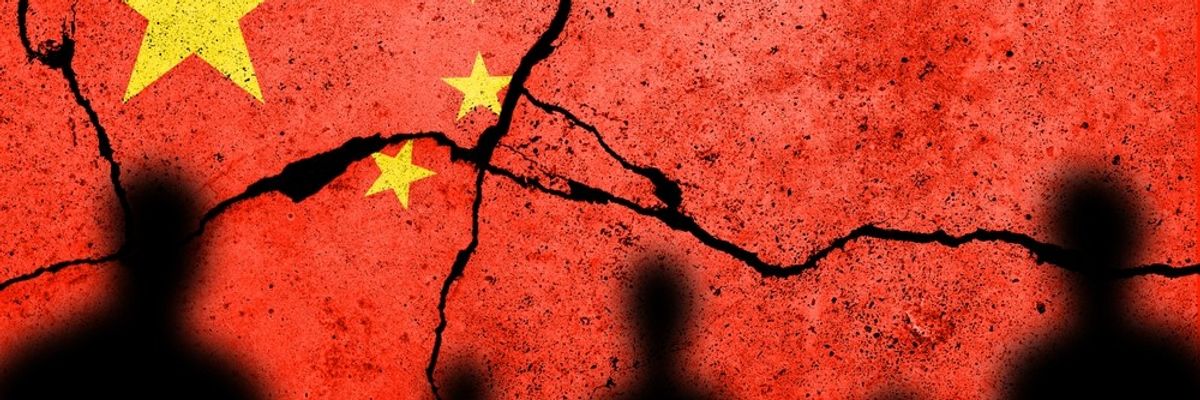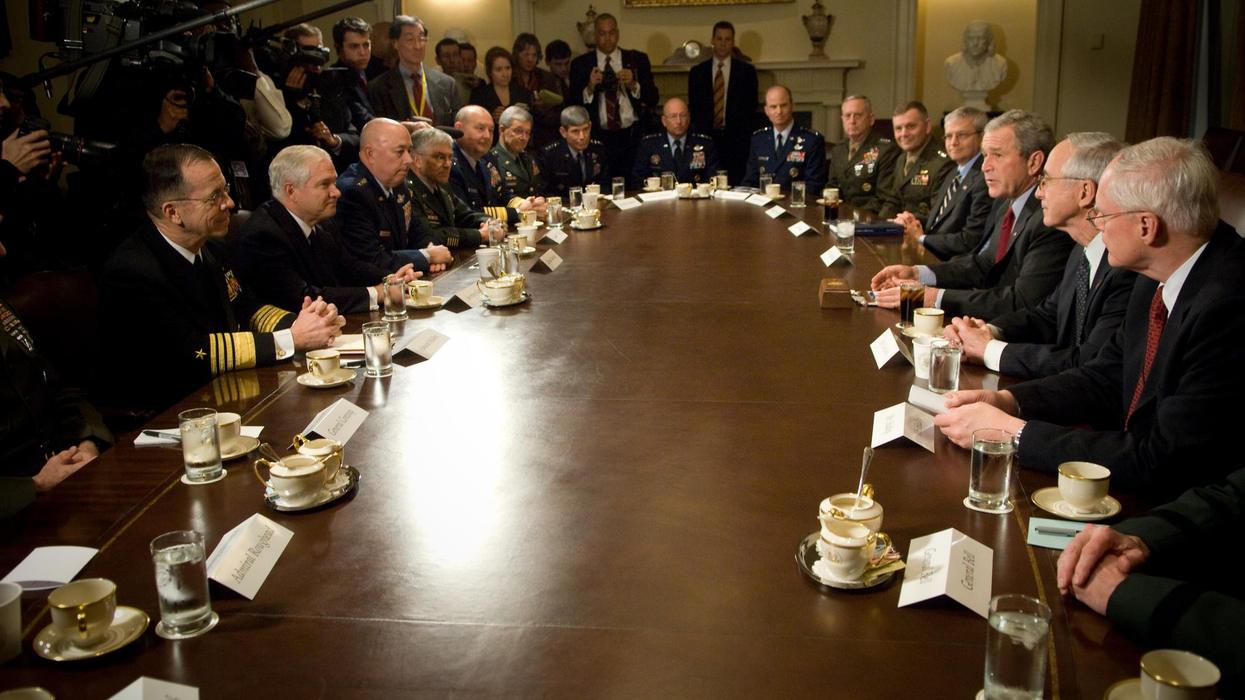The Biden administration is persisting in its months-long effort to extend Beijing an open hand and mend damage caused by the spy balloon incident in February.
But Beijing has answered with a closed fist, imposing a freeze on high-level talks: it did not respond to several requests for a call between President Biden and Chinese leader Xi Jinping, blocked the rescheduling of Antony Blinken’s first visit to China as secretary of state, and has refused meetings with Secretary of Defense Lloyd Austin and other senior Pentagon officials.
“Overtures have been made by us to have engagements with them, they have not taken up on those overtures,” State Department Counselor Derek Chollet told Singapore’s Straits Times in mid-April. The United States remains committed to frank and open dialogue, he continued, but “it is not happening, and I think it is a question better placed to them on why not.” Speaking on Tuesday, U.S. ambassador to China Nicholas Burns reiterated that “our view is we need better channels between the two governments and deeper channels, and we are ready to talk… and hope the Chinese will meet us halfway on this.”
But Beijing has consistently and clearly explained its actions, alleging that the administration has gone against the spirit of what Biden told Xi in their first face-to-face meeting as heads of state in Bali this past November, specifically by not upholding its “one China policy” towards Taiwan.
Though the downing of the spy balloon was the most immediate cause of Beijing’s diplomatic freeze, its frustration had been brewing for months; Washington, it seems, is just choosing to ignore it. As Xu Bu, a former diplomat and president of the state-affiliated China Institute of International Studies, told the Wall Street Journal on Sunday, “If the One China policy is not being abided by, if the One China principle is no longer the policy of Washington, D.C., then any guardrail or any kind of floor won’t be possible.”
The Bali meeting seemed to set the stage for a genuine revitalization of ties, repairing the damage caused by House Speaker Nancy Pelosi’s trip to Taiwan last August. Biden and Xi agreed that Blinken would soon visit China and meet with Xi himself, while new life was breathed into channels that had been closed for months: by the following week, Treasury Secretary Janet Yellen, U.S. Trade Representative Katherine Tai, climate envoy John Kerry, and Defense Secretary Austin had each held extensive talks with their Chinese counterparts.
Signs that this truce would not hold, however, began appearing in December. On December 6, the White House announced that $425 million worth of parts and equipment would be sold to Taiwan’s military aimed at what it said were “efforts to maintain a credible defensive capability.” The Chinese Foreign Ministry called the sale a “blatant violation of the one-China principle and the provisions of the three China-US joint communiques” — both longstanding fixtures of U.S. policy towards Taiwan, although Washington calls the former the “one China policy.”
This was a clear warning shot from Beijing. According to the Chinese readout of the Bali meeting, Xi expressed his “hope that the U.S. side will match its words with action and abide by the one-China policy and the three joint communiques,” while Biden reiterated that the “U.S. government is committed to the one-China policy.” Although Washington has long maintained that arms sales to Taiwan are consistent with its past and current pledges to Beijing, Beijing was evidently signaling its belief that Biden’s actions did not match his words and that these moves went against the spirit of the Bali meeting.
The Foreign Ministry also asked the administration to “earnestly act on the commitment made by the US leadership of not supporting ‘Taiwan independence.’” According to the Chinese, Biden had told Xi in Bali that the United States “does not seek a new Cold War, does not seek to revitalize alliances against China,” and “does not support ‘Taiwan independence.’” The comparably vague White House readout does not mention these statements, but they were never denied.
Beijing levied the same criticism against the annual NDAA defense spending bill passed that month, which included major provisions on security assistance and training for Taiwan. Senator Bob Menendez, who helped spearhead their inclusion, said the bill “will be one of the most consequential in years… for setting the theater for real deterrence by implementing a more resilient strategy for Taiwan,” adding that it “will clarify in even starker terms the reality of the U.S.-Taiwan relationship: Taiwan’s democracy remains the beating heart to our Indo-Pacific strategy.”
Chinese Foreign Minister Wang Yi spoke with Secretary Blinken the day before Biden signed the NDAA into law. After briefly praising the progress made at Bali, Wang warned that “the United States should not pursue dialogue and cooperation while containing and stabbing China in the back.”
In particular, he called for the administration to “stop using salami tactics to challenge China’s red line” — a phrase referring to Washington and Taipei gradually removing any limits on their relationship. According to Beijing, Blinken reiterated to Wang that the administration “will continue to follow the one-China policy and does not support Taiwan’s ‘independence.’”
On December 25, the day after Biden signed the NDAA approving military aid to Taipei, China held large-scale military exercises aimed at Taiwan, a “resolute response to the escalating collusion and provocation by the United States and Taiwan,” in the words of a PLA spokesperson. The State Department approved a further $180 million worth of arms sales to Taiwan on December 29, and on January 5, a U.S. warship transited the Taiwan Strait for the first time in two months, demonstrating “the United States’ commitment to a free and open Indo-Pacific,” the U.S. Navy 7th Fleet said in a statement.
China held another major exercise around Taiwan days later, again intended to “resolutely counter the provocative actions of external forces and Taiwan independence separatist forces.”
Amid these heightened tensions, Chinese Defense Minister Wei Fenghe declined to participate in a proposed call with Austin set for January 6. Austin confirmed at the time that he had not spoken with Wei since the two had agreed to improve ties in November.
Nonetheless, dialogue continued on other issues such as climate, and Blinken’s visit was still set for February. The White House, however, canceled it hours before his scheduled departure in response to mounting political pressure over the spy balloon incident. Although the administration was justified in shooting down the balloon, and faced criticism from Congress for not doing so immediately after its detection, the spectacle evidently embarrassed Beijing.
This also came as the administration was making charges that Beijing was considering providing lethal arms to Russia for use in its war in Ukraine, which Blinken publicly warned Wang against doing in a meeting in Munich, another source of embarrassment.
Secretary Austin again tried to call Minister Wei hours after downing the balloon, to no avail, and Beijing was not ashamed to acknowledge this snub, explaining that the “irresponsible and seriously erroneous approach by the US did not create a proper atmosphere for dialogue and exchanges between the two militaries.”
In a major speech on the balloon incident on February 16, Biden reiterated the importance of maintaining open lines of communication and said that he expected to speak directly with Xi soon. Despite further attempts by national security adviser Jake Sullivan to push for a call, it has yet to happen, with Xi instead taking a rare public shot at the United States in March when he complained that “Western countries led by the United States have implemented all-around containment, encirclement, and suppression of China.”
In the background, tensions related to Taiwan continued to build. Taiwan’s foreign minister led a senior delegation to Washington for high-level meetings in February, concurrent with a trip by the Pentagon’s top China official to Taiwan, the first senior defense official to visit the island in the Biden administration. Responding to comments made by Blinken around this time that Taiwan “is not an internal matter” but “a matter of concern to quite literally the entire world,” the Chinese Foreign Ministry had “a clear message for the US: it is time to stop,” warning of “real costs to the US” if it “refuses to change course.”
In March, the State Department approved an additional $619 million arms sale, and Taiwanese President Tsai Ing-wen’s April meeting with House Speaker Kevin McCarthy dealt yet another major blow.
The administration nonetheless continued to push for dialogue and has found limited success at lower levels, including efforts to manage the blowback to Tsai’s visit. Jake Sullivan told Politico last week that Blinken, Yellen, and Commerce Secretary Gina Raimondo would each engage with Beijing “in the coming months,” and Blinken said Wednesday that he was hopeful his visit would come this year. John Kerry also announced that Beijing has invited him to China for climate talks “in the near term.” But Beijing has continued to insist that it rejects “communicating for communication’s sake,” with the Foreign Ministry telling the Wall Street Journal on Sunday that Washington “should stop claiming it wants to maintain communication while damaging the political foundations of bilateral relations,” a clear reference to Taiwan.
Through all of this, China lacked a sitting ambassador in Washington, the longest vacancy since diplomatic ties were established in 1979. One informal envoy has been former Amb. Cui Tiankai, who visited Washington in late March, reportedly making stops at the State Department and National Security Council.
Speaking back in China in April, Cui criticized the administration for not honoring promises made in prior meetings, specifically citing Taiwan: “What’s the point of meeting if what is said in the meeting has no credibility?” Cui asked. In interviews with Chinese media, he also said that “the US’ attitude has changed” toward its past pledges on the one China policy and three joint communiques, and that it is “eroding” the former “little by little.”
Beijing’s overarching message over the last six months, then, has been quite clear: it has spurned Biden because he has not followed through on its interpretation of what he told Xi in Bali, both in his general handling of the spy balloon incident and especially his actions related to Taiwan. From Beijing’s perspective, Biden is gaslighting Xi, and a resumption of high-level talks would only serve to further encourage and legitimize this behavior.
Washington may disagree with Beijing’s view, and may have legitimate reasons to do so, but with each passing day, the gap between the two sides’ interpretation of their “consensus” on Taiwan grows more apparent and irreconcilable. Both sides believe their respective positions regarding Taiwan are justified and they appear nowhere near coming toward an understanding that eases tensions.
As it has been doing, Washington can choose to continue ignoring this dynamic, hoping to have its cake and eat it too. But it cannot ignore the consequences, and Beijing has all but said that those include putting the relationship on a path that will only end in conflict.

















